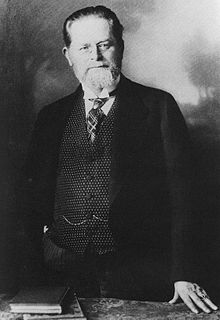Arthur von Gwinner
Arthur Philipp Friedrich Wilhelm Gwinner , from 1908 by Gwinner , (born April 6, 1856 in Frankfurt am Main , † December 29, 1931 in Berlin ) was a German banker , politician and art patron .
Life
Gwinner came from a well-known Frankfurt family. His grandfather Philipp Friedrich Gwinner was a lawyer, art historian and penultimate mayor of the Free City of Frankfurt , his father Wilhelm Gwinner was a lawyer, writer and a confidante of Arthur Schopenhauer , whose first name the son received. After visiting the Hassel'schen Lehr- und Erziehungs-Anstalt for boys , Gwinner completed a banking apprenticeship, which was followed by long stays abroad. In 1885, he married Anna Speyer (1861–1940), daughter of the German-Jewish banker Philipp Speyer (1815–96) and his wife Charlotte Stern (1824–?) In Frankfurt am Main .
Gwinner could have entered the Frankfurt banking house Lazard Speyer-Ellissen as the owner , but preferred to go to Berlin , which at the time outperformed Frankfurt as the leading German financial center . In 1888 he became the sole owner of the Berlin bank Riess & Itzinger , which he continued under his own name. In 1891 he joined the Society of Friends and brought the Alhambra dome with him to Berlin as a gift, which is now in the Museum of Islamic Art in Berlin . In 1894 he liquidated his bank to take a position on the board of directors of Deutsche Bank , where he worked closely with Georg von Siemens . He was on the board until 1919, from 1910 to 1919 as its spokesman. To this day he is the only Frankfurt-born spokesman for Deutsche Bank, which has been based in Frankfurt since 1957. From 1919 to 1931 he was a member of the company's supervisory board . From 1916 until his death he was a senator of the Kaiser Wilhelm Society .
Gwinner was involved in the financing of the Baghdad Railway , AEG and Siemens . Due to his international experience, he was responsible in particular for the international business of Deutsche Bank and was therefore also considered a German foreign policy maker at the time.
Gwinner's father received the hereditary title of nobility in 1908 . Arthur von Gwinner was appointed to the Prussian mansion (the "upper house" of parliament) by Wilhelm II in 1910 . In the following, he made a name for himself as an opponent of excessive national debt : Gwinner gave a sensational speech in 1910 in which he criticized the budgeting and the deficit economy of the Prussian Ministry of Finance, which was damaging to the state credit. His famous saying during this debate: “Talent is part of everything, but borrowing requires genius!” Was later widely rumored in Berlin.
In 1921 he was awarded an honorary doctorate from the University of Erlangen ( Dr. rer. Pol. Hc ) and in 1922 that from the University of Frankfurt am Main ( Dr. phil. Nat. Hc ).
In addition to banking, Gwinner's diverse interests were primarily in mineralogy and botany. He was a corresponding member of the Senckenberg Natural Research Society . In 1911 he was one of the founders of the Frankfurt Schopenhauer Society and donated the library of the Schopenhauer Archive to the city and university library .
In 1911 he acquired the Krumke estate and castle in the Altmark west of Berlin, had it renovated and expanded, and used it as a family seat. After his death he was buried in Krumke. His grave is in the town's small cemetery. The hereditary funeral of the Arthur von Gwinner family created by Georg Wrba in the Dreifaltigkeitskirchhof II in Berlin-Kreuzberg remained unoccupied. A plaque commemorates him on the Gwinner family grave in Frankfurt's main cemetery .
His daughters Margarethe, married to the violinist Karl Klingler , and Charlotte von Gwinner , who was briefly married to Berndt von Wedel, inherited the manor, but were expropriated as part of the land reform . According to newspaper reports, the family received compensation after German reunification . But this was probably only a part of the actual value.
Memberships
Arthur von Gwinner became a member of the Paleontological Society in the founding year 1912 .
literature
- Wolfgang Arendt: Gwinner, Arthur Philipp Friedrich Wilhelm von. In: New German Biography (NDB). Volume 7, Duncker & Humblot, Berlin 1966, ISBN 3-428-00188-5 , p. 361 ( digitized version ).
- Reinhard Frost: Gwinner, Arthur (von) in the Frankfurter Personenlexikon
- Max Fuchs: Arthur von Gwinner: A dedication on his seventy-fifth birthday , Berlin 1931 (without publisher)
Web links
- Literature by and about Arthur von Gwinner in the catalog of the German National Library
- Newspaper article about Arthur von Gwinner in the 20th century press kit of the ZBW - Leibniz Information Center for Economics .
- Biography of the Historical Society of Deutsche Bank
- Anna McSweeney: Arthur von Gwinner and the Alhambra dome from Julia Gonnella and Jens Kröger (eds.): How Islamic Art came to Berlin. 2015 National Museums in Berlin - Prussian Cultural Heritage and Dietrich Reimer Verlag, Berlin
- Jens Kröger: Alhambra dome (2012). Museum With No Frontiers - Discover Islamic Art
- German digital library: Alhambra dome
Footnotes
- ^ Jörg Nimmergut: Historical securities - collect meaningfully - win guaranteed, p. 55, ISBN 3-89441-042-6
- ^ Arendt, Wolfgang: Gwinner, Arthur from in: Neue Deutsche Biographie 7 (1966), p. 361 online version .
- ↑ Volksstimme
- ^ Palaeontological Journal 1, Issue 1, March 1914
| personal data | |
|---|---|
| SURNAME | Gwinner, Arthur of |
| ALTERNATIVE NAMES | Gwinner, Arthur Philipp Friedrich Wilhelm von (full name); Gwinner, Arthur |
| BRIEF DESCRIPTION | German banker, politician and patron of the arts |
| DATE OF BIRTH | April 6, 1856 |
| PLACE OF BIRTH | Frankfurt am Main |
| DATE OF DEATH | December 29, 1931 |
| Place of death | Berlin |


